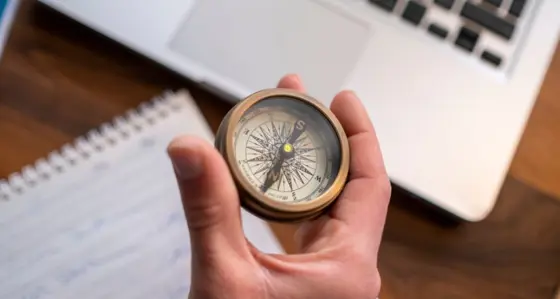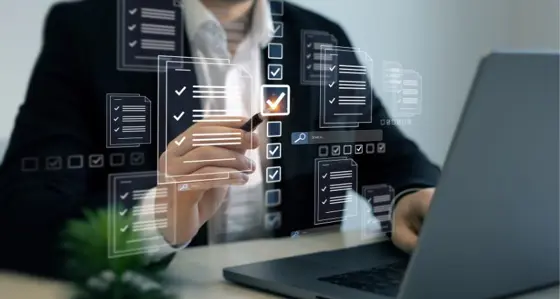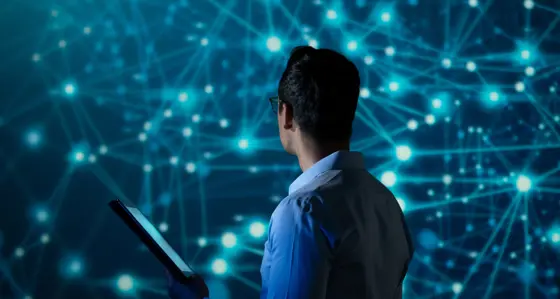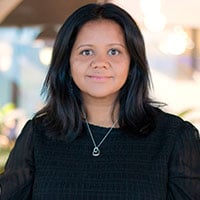Mansi: Hello and welcome to the third episode of our COO podcast, The Rise of the COO. Bringing together chief operating offices, subject matter and industry experts to tackle pressing topics that matter to COOs in today's world. My name is Mansi Patel and I'm a capability sector leader and COO, network sponsor at Baringa. Our last episode discussed the COO's role in managing risk data and communications, as well as how to unlock the power of AI. It was a fascinating discussion, so please do have a listen if you missed it. In today's episode, we discuss owning the Net zero challenge as COO, exploring how COOs can not only manage the energy transition while keeping their business running smoothly, but also use it as a chance to innovate and grow. I'm so pleased to welcome our guest speaker today, Ramona Vlasiu, Chief Operating Officer at E.ON next and member of the Board of Directors E.ON UK. Welcome, Ramona.
Ramona: Thank you, Mansi, and really pleased to be here and thanks for the invite.
Mansi: Perhaps before we get started, I'm sure our listeners would be really interested to hear a little bit about your career journey and what's brought you to this role.
Ramona: Yes, it's quite an interesting career actually, because I'm actually a lawyer, an M&A lawyer. So I started my career in E.ON. Supporting through the privatization process 18 years ago. And then I just decided to stay longer supporting the privatization. Then I was responsible for the unbundling, which is the separation of the network operator and retail business back in Romania, where I'm originally from. And then I just stayed and been part of the gas network operator as managing director, then into customer operations. That is sales and then through a development path ended up in the UK as part of being more international and getting out of my comfort zone. So I came to the UK ten years ago initially with a view to stay a couple of years, but I just fell in love with the country, the people, and since then I've done quite a lot of transformation programs. And the last one, probably the biggest one would be the creation of E.ON Next which I'm very proud to be part of it from day zero, when it was just a concept on a piece of paper. So E.ON Next is basically the combination of what was used to be in retail business and empower retail business. Both businesses have now been winding down through a quite a big program. And then out of that, we created y E.ON Next. We changed the operating model and then migrated our customers into a new platform. So that's E.ON Next. And then that came to a different stage of maturity this year when from just being a retail business, from a commodity perspective, we're now incorporated with a net zero delivery smart metering. So all the solutions into E.ON Next and that's not part of my job in terms of managing net zero operation responsible for 6 million customers and 8000 colleagues in E.ON. Wow.
Mansi: That's probably the word that brings to mind. And what a wonderful career to just hear you convey, both in its variety of where you've lived and worked, but also in terms of different component parts of the business that you've had the experience of sitting across and understanding as well. It's just really nice to see people stay in careers where they've had such an experience, giving them so much movement in this day and age. Now a topic for today, as I mentioned, is linked to net zero. So perhaps I'll dive in with a question. In that space, you've taken a core role in the net zero journey for E.ON, as I understand it. How exciting a huge societal and business issue that definitely requires something truly different and transformational in nature. And perhaps my question for you is, as a COO, what is your role in the energy transition and what are you preparing for with respect to that as well?
Ramona: Yeah, sure. So, as I said, the part of my role from 1st of April is pretty much, as I said, I call is the means to cash. It is literally from installing meters, smart meters primarily, which are the gate to the net zero from my perspective, into managing all the customer queries, managing debt and vulnerabilities, to the actual net zero installation through either retrofit market or through all the government schemes like young company Obligation Eco, as we call it, DB scheme. So, basically my role encompasses pretty much an end-to-end operation and dealing with a customer experience end to end. So that's quite a quite a big undertaking. And if I look to where we're going in terms of a transition to net zero, I can say that I feel privileged to be part of this. As I said, I am managing at the moment. I have in my portfolio 6 million customers. That's quite a big scale in terms of net zero, but also 8000 colleagues which I'm responsible for. So I think from my perspective, the energy transition goes from being at the moment quite a one directional relationship between the energy supplier and the customer to a much more complex, I call it bi-directional relationship, where the energy transition gives customers agency because we. move from a very centralized system through a decentralized system where a customer having their home quite a lot of technology from smart meters, as I said, to heat pumps, solar panels, batteries, even chargers, although all of that system creates a huge amount of complexity also for customers. So I think I see my role and the operation I'm running and helping customer support the customer getting through that complexity, but also getting the benefits out of it, which I think is probably the most important thing. So yeah, I think my role is enormous in that, to be honest, and I really feel quite a big responsibility in that. Yeah.
Mansi: And the impact of it I think is huge as you've described, and there's always challenges and things like that. How do you think about or expect that bi directional relationship to emerge? Is that where one of the challenges will reside, or are you pushing on an open door there?
Ramona: Yeah. So I think this is part of the challenge. So first of all, as I said, it's quite complex. First of all, for customers to really think about the technologies being deployed in their home. So our first and number one task is how do we simplify that for customers. How do we educate the customer, but not just educate them, help them access those new technologies. Because if we're really serious about net zero leaving no one behind. So that means that our responsibility as an energy supplier is to make sure that we find the right propositions that actually tackle every single part of society, not just those at the upper funnel of their society, the ones that can afford those technologies. So it's a huge undertaking from our perspective. So how do we make that happen? How do we enable everybody to come along? And once they have those technologies in their home it is quite complex again, So how do we help them to manage that? Because as I said, for the first time in the energy system, the customers are relevant? And that is a big change in itself. So again, we play a huge part of that.
Mansi: Yeah. And as a topic net-zero, some people are all in and really understand it and others don't. Obviously in your industry there's a huge amount of awareness of it in your own organization you described of the 8000 colleagues, but what's it taken to get this talked about at the board level? At the C-suite level.
Ramona: It's in everything we're doing. To be honest. Our purpose, if you if you ask me, Mansi, is making sure that we lead the energy transition and not just create that sustainable way of using energy, but actually make it affordable and accessible. So that is the purpose that we we see ourselves running the business.
Mansi: And I knew you would say that as an answer, but I thought it might be nice to put that out there as a little bit of a reminder for everybody as well. How do you balance this with the other forces at play? Customer debt, cost of living. How are you and your industry partners thinking about and how will you balance that?
Ramona: Yeah. So I think it's a really valid question. And actually from my perspective and not just my perspective, I think having conversations at board level energy transition and affordability can't be viewed as two separate contradictory factors. I think they're highly interdependent. So I think the energy transition has the potential to change the way we look at energy in itself from being just as significant, to be honest, cause of poverty at the moment. So having been through the energy crisis, we know what a big burden energy bills are for our customers and I can see that in our operation day to day dealing with customer affordability and cost of living. So that's a massive thing for our customers. So having that at the moment to be a cause of poverty, I can see the energy transition going to something where it's not just affordable for all, but actually it could be a lever to lift people out of poverty. And then you might ask, how is that even possible?
Mansi: That was my next question.
Ramona: How's that? So the way we see that is basically at the onset, it could be like a theoretical thing. How would you do that? How do you make that possible for every, single part of our society? So at the moment, we are actually trialing something which I honestly think is pushing the boundaries of that. And we started a pilot in Coventry. The reason why we've chosen Coventry is because Coventry is our home for probably more than three decades as E.ON being in Coventry City, but also E.ON became the energy strategic energy partner for the Coventry City Council in their kind of mission to decarbonize the city. So as part of that mission, we've looked at the residential customers, which is also part of my remit in terms of the retail business in your next. So we looked at all the customers which are living at the moment in very poorly insulated homes to start with, but also customers that struggle with their debt. So we looked at the portfolio of customers we have in the Coventry City and we said, How about us as an energy partner? We looked at everything which is available for those customers. Again, there's government schemes like eco Divis. There's ability for us to then through our energy fund, support customers changing their we call it energy vampires, you know, the things that they have in their home that are not energy efficient. So we support that through our energy fund. We then help the customer navigate through that complexity, accessing energy efficiency from. Home insulation to putting a heat pump, which we know is more efficient than a boiler. Having a solar panel on their roofs, all of that, as I said, giving them a bit of a free start in terms of debt, helping them, changing their appliances in the home, insulating their home through eco schemes, putting a solar panel. But what we also brought to that proposition is a battery, which is not usually included in that. So the battery then gives those customers the ability to store the energy when that off peak, when it's cheaper and then consume the energy when from the storage at high peak, when the prices are much more expensive and with a time of use tariff, obviously it gives that customer the ability to access things that maybe a normal circumstances they would never do and you would think that would be accessible only for people that can afford those very high technologies. So we're bringing all of those things and making it easy for them because again, customers don't know where to access those things. So the proposition is really making that customer experience very smooth. We take care of everything and then we give the customer the ability to use all of those technologies and make the best out of them. Now, imagine that that's just the pilot. Imagine that on national scale and imagine the possibility of that changing the way people interact with energy and actually lift them in a more sustainable way out of their poverty at the moment. So I think it's exciting, very exciting.
Mansi: You've had me immersed just as you've been sharing that, as I've visualized it and pitch it along the way. And whilst you described it as you're making it easy for the customer, what really struck a chord with me is just how much thought has had to go into all of these different components to make it easy. So I think that is incredible just to hear that story. How is the pilot going?
Ramona: Well, we just started to email the customers and wrote to the customer, obviously with the support of the Coventry City Council. We now obviously want to see the response rate and we are ready to go in terms of deployment of those measures and make it happen for them..
Mansi: It comes to things like creating impact and things that really matter, clearly this pilot is something that would deliver something like that.
Ramona: Incredible. And that there's other things, to be honest. I mean, if you look as I said, there's lot of things out there that are happening government wise in terms of support, but sometimes they're just sticking plasters and they just give a little bit of relief for customers but not rehabilitate them for long term, especially most vulnerable ones. So apart from this, we're also looking and have conversation with government. For example, if you look at the warm home discount, it's 150 pounds for every eligible customer. Now, that's again, is a sticker plus to give the money customers happy for a little bit of relief, but then it's back again in the same situation next year. So what we want to do with the government to say why not use that money and actually having like a subscription to a battery while you install all of those nice energy efficiency technologies in their home. So use that welcome discount for a subscription for a battery, which then gives the customer in a much more sustainable way a minimum of 250 pounds for 150 pounds of subscription. So again, there's lots of ways in which I think and I see my role and our operational role to support customers in that journey.
Mansi: Right. And along the way, you obviously described some things here which are new, innovative in nature. Are there any other key innovations that you see perhaps support the transition to net zero that you are bringing to your operation? What excites you about some of these innovations as well?
Ramona: Yeah. So that's I think I've always said to my colleagues that when we think about innovation, we sometimes tend to think of cutting edge technologies and something future kind of what future brings. But sometimes innovation is simpler than that. Yes. And it's actually sitting in front of us. And the example I've just given for me, it's an innovation in itself. So the number one thing I've always said to my colleagues that thing that we have already around us and how can we bring them in more innovative proposition. That in itself is an innovation which could change people's lives in the way they, as I said, interact with our energy. We're doing other things. Of course, we're looking at AI and I know you had the previous episode on AI absolutely for us and for me, it's a game changer for sure. We're looking at things that how we would support our energy specialist. We're deploying AI at the moment, our internal knowledge system. So make sure that we, as a set, support our energy specialism navigating through the complexity, as I said, because the system of the ecosystem in energy changes massively, the interaction with customer becomes much more complex from just a pure I don't understand my bill to a bigger, bigger ecosystem that happens in their home. Our energy specialist needs a lot of support, so we are deploying quite a lot and putting a lot of effort into innovation in that space. Again, making their life easy and navigating through that.
Mansi: And with all the change that is continually underway in all of the different players within the energy ecosystem, how do you think about the skills capabilities you need within your own business to keep adapting, changing to either work with the customer, work with the energy suppliers, or actually just to drive the innovation itself?
Ramona: I think it's a combination. So I see the role of partnerships really important in this transition. To be honest. Every company has this limitation. So, yes, through our deployment of innovation, yes, there's things that you always need to reinvent yourself internally through your own capabilities and skills. And I will come to that in terms of where do we see, let's say, the investment in our kind of skill upgrade for the net zero going partnerships are really important. And this is where we put a lot of focus lately in understanding what's out there. We have a team actually in Germany and actually we have a local team in Palo Alto, so we're constantly keeping ourselves kind of touch with the reality of everything that happens around us. But to give an example, a concrete one, we just signed a partnership and exclusivity partnership with Amber. So Amber Electric is a market leading player in Australia and they have deployed a software which it's a true game changer in terms of the way they give the customer again back agency, how they help customer manage flexibility, manage their solar panels, participate actually in the market and not just getting the best out of their technology, but actually making money. So I can't say more about that because it's inflight and is going to be launched first half of next year. It's unique for the UK market. I think Australia is further advanced than the UK in terms of energy transition. I'm really excited. So nothing is going to be a game changer for the customers here.
Mansi: Well, I look forward to seeing that emerge and I look forward to it being received with the agency that you described, which I think is so important. Putting people in control of that, I think this is the right sentiment and pull for how they feel about the organisations that provide services to them as well.
Ramona: Okay, great, great. So but there was the second part of your question about internally. So again, that's the partnership. And there's lots of other examples of that but internally, again, the transition itself, you know, we're looking at our engineering forces. I've talked about the energy specialists in the front line. So that's one element which we need to make sure they can deal with the complexity that's out there and making sure we support them in that. But then we look at our engineers and the way that, again, we're changing the skills that's required in the net zero, we call them the green jobs. Again, it's an enormous task for us to do and I think we're very well positioned to do that. Last year we have opened our net zero Academy, so we are training our engineers for the future to become net zero engineers in terms of installing heat pumps, heavy chargers, solar panels, batteries and so on and so forth. So again, a huge investment in that. And if you ask me, Mansi, before we even go into those green kind of jobs and skilling and upskilling your workforce to be able to deliver the net zero, one of the things what I'm really, really precious about is making sure that you build an organisation, an inclusive organisation. And the reason why I say that, and I've seen that in our kind of dynamic when we develop propositions, the more diverse organisation you have that reflects the communities your customers are living, the higher the chances. When you develop propositions, they actually are tailored for their needs and use them. So I've put in an incredible amount of investment in making sure that that is happening in E.ON and for me that I myself is getting ready for the future.
Mansi: I love that for the COOs who are out there today who haven't quite been able to galvanize behind this agenda in the manner that you've described, is there anything that you would give them as a thought or a suggestion to think about in how to move this agenda forward?
Ramona: As I said, seeing energy transition not as a threat, but as a huge opportunity for the organisation that they are in. I think, again, it's a huge opportunity for us to make a difference is one of the biggest agenda topics for the world, if you ask me from a planet perspective and how do we take care of this good thing that we have around us? So it's a huge opportunity. I think it gives us a set meaning to people and purpose to people. I had people joining in from big companies like Amazon, for example. And when I ask them, Why do you want to join us, they said, because you have purpose. So again, I really think that embracing the energy transition as a huge opportunity is probably my biggest advice for everyone.
Mansi: Great advice. And I think having purpose at the core of some of what you're doing is so instrumental for people in terms of how they feel affiliated to the place that they work.
Ramona: I agree 100%.
Mansi: I wanted to ask you perhaps a final question. You talked about this agenda being so important for us in the world, and we've heard a lot about what it means to you at E.ON and the role that you do. How do you embrace this in your personal life?
Ramona: I think my kids definitely. My daughter, she's six years old, so I have a three year old and a six year old, three years old, probably not really conscious, but my six year old comes home and constantly teach me about not leaving the lights up and, you know, be taking care of the planet. Obviously, it comes from school. I also always encouraged them in that. As I said, I'm fortunate I live in a house which is not really energy efficient at the moment. It's quite an old house. And I'm trying to upgraded it to make it energy efficient and actually test a few things so my team knows me that I'm going and testing during these customer journeys. How that works. I don't want any preferential treatment. I want to go through what the customers are going in my own home and actually experience the things so then I can feedback and make it better. So I'm trying my best to be a very good citizen.
Mansi: Well, I think you do an incredible job on this, so it has been absolutely fascinating. Thank you for speaking with us today, Ramona, and actually hearing the journey both you've been on personally to get into this role and this part and aspect of your role, which I know isn't the only thing you do, because we've connected to our own network across a whole range of other topics. I've been really impressed by both the nature of the thinking and the journey that you're on, but actually the thought behind it with the consumer customer in mind and really thinking about what this means for them as well as the world and the planet that we live in. So fabulous to hear from you today. Thank you so much for joining and thank you to you, our listeners, for tuning in. I hope you enjoyed today's podcasts and there are a few nuggets and takeaways for you to needle on and I look forward to welcoming you to our next podcast in the New Year.






